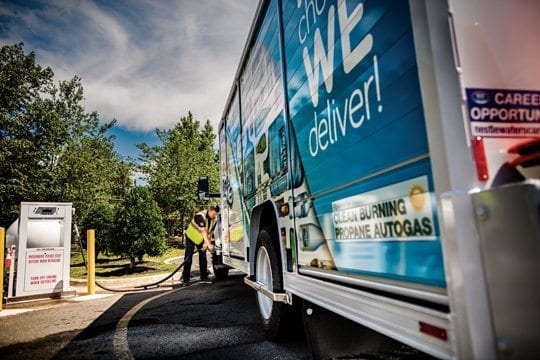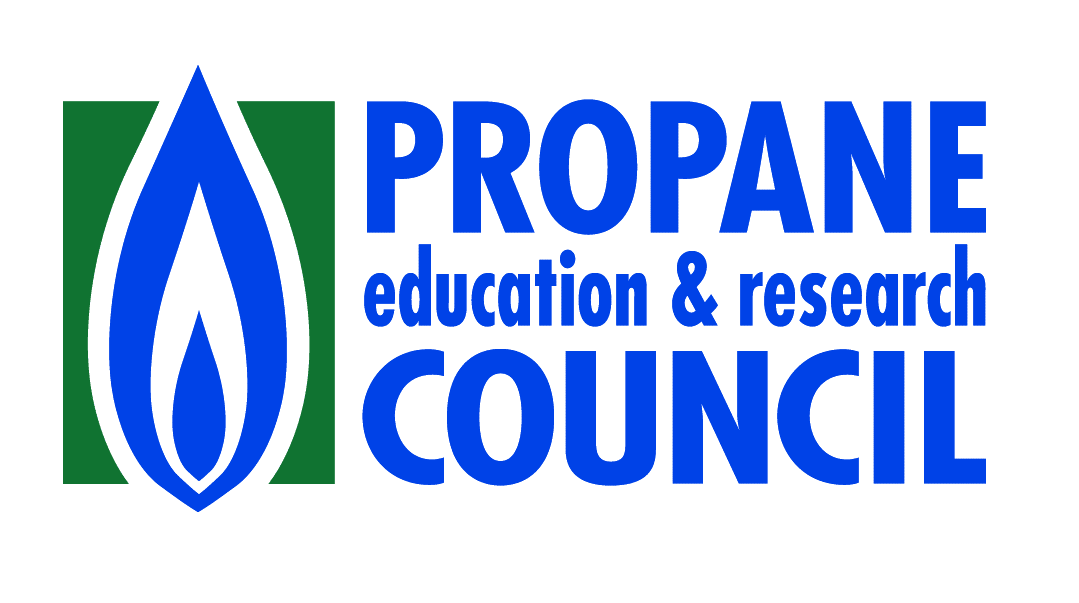Propane autogas vehicles have helped fleets lower emissions and costs for decades. But modern propane autogas trucks, buses, and vans are getting even cleaner as new engine technology develops. Most recently, ROUSH CleanTech unveiled its new low-NOx propane autogas engine, which actually cuts emissions of the pollutant to 0.05 grams per brake horsepower hour (g/bhp-hr).
Now is a great time to consider transitioning to propane autogas because both private and public fleets can apply for a piece of the $2.9 billion Volkswagen Environmental Mitigation Trust settlement fund. The intent behind the VW settlement funds is to reduce the amount of NOx emissions in the U.S., so vehicles powered by the new ROUSH propane autogas engine easily meet those guidelines.
Propane autogas provides the lowest total cost-of-ownership over the life of a vehicle when compared with gasoline or diesel.
There are several other reasons the ROUSH engine and propane autogas, can benefit fleets looking to switch from using diesel, including going the extra mile on emissions regulations, cutting costs, and the adaptability of the engine and fuel to a fleet’s needs.
Lower emissions benefits fleets, employees and communities
It isn’t every day that fleets can claim that their vehicles produce not just low emissions, but the lowest NOx levels of any engine in class 4-7 vehicles. Not only is this a great message to capitalize on for marketing a fleet to customers — or to civic leaders and taxpayers for public fleets — but it can contribute to a healthier company and community. The NOx levels and other particulates found in diesel exhaust can contribute to human health problems, such as asthma and respiratory issues, as well as harmful effects to the environment like ground-level ozone and smog.
Propane autogas is naturally lower in NOx than gasoline and diesel. Heavier-duty propane autogas vehicles reduce NOx by about 60% compared to diesel engines. Propane autogas vehicles also emit about 20% less NOx than gasoline vehicles. At 0.05 g/bhp-hr, the ROUSH engines take it even further:
- The engines are 75% cleaner than the EPA requirement of 0.20 g/bhp-hr.
- The engines are 99% cleaner than pre-2007 diesel vehicles.
- ROUSH’s low-NOx engine is EPA- and CARB-certified, and also certified to CARB’s optional low NOx standards.
Increasingly tougher standards on NOx emissions have been the trend for almost 20 years in the U.S. For employees, driving and maintaining vehicles that produce the lowest NOx levels can be a point of pride. For fleets, too, the message can attract green-minded people who want to work with companies doing more for the environment, or who want to reduce exposure to emissions around sensitive populations such as children and those with existing respiratory illnesses.
A more cost-effective choice
Another advantage of using a propane autogas powered low-NOx engine is that it achieves the lowest emissions without any extra hardware and no increased incremental cost to the engine by making significant calibration and cold-start spark retard changes. The engine also provides the best NOx emissions reduction per dollar spent.
Using the 2016 version of AFLEET developed by Argonne National Laboratory to compare replacing a Type C diesel school bus with a new school bus, propane autogas buses cost $177 per pound of NOx reduced. New clean diesel buses cost $272 per pound of NOx reduced, and electric buses cost $506 per pound of NOx reduced, making a propane autogas bus 33% more cost-effective than clean diesel and 65% more cost-effective than an electric bus.
Propane autogas also provides the lowest total cost-of-ownership over the life of a vehicle when compared with gasoline or diesel. Unlike new, clean diesel buses that require additional fluids, filters, and maintenance requirements, there are no hidden costs with propane. Depending on the current cost of fuel, some fleets have been able to recoup their initial investment on propane autogas vehicles in as little as two to three years.
A fuel that works for a variety of fleets
Propane autogas is also a flexible fuel for fleets, with options from vehicle models to refueling infrastructure that can be tailored to individual needs and don’t often have a time-consuming transition. ROUSH’s low-NOx certification covers the 6.8L V10 3V propane autogas engines for Type C Blue Bird school buses and class 4-7 Ford commercial trucks and vans. Propane retailers located throughout the U.S. can help fleets get set up with one of several refueling options that can be tailored to a fleet’s budget, space and route needs. In addition, new quick-connect nozzles for propane autogas refueling are simple, safe and mirror the experience of refueling with gasoline and diesel in many ways.
The ROUSH low-NOx engine shows that propane autogas engines can both compete and exceed the expectations fleets may have from using conventional fuels, with the added benefits of low costs, flexibility and very low emissions.
For more information on how fleets can benefit from using propane autogas, visit propane.com/on-road-fleets.



